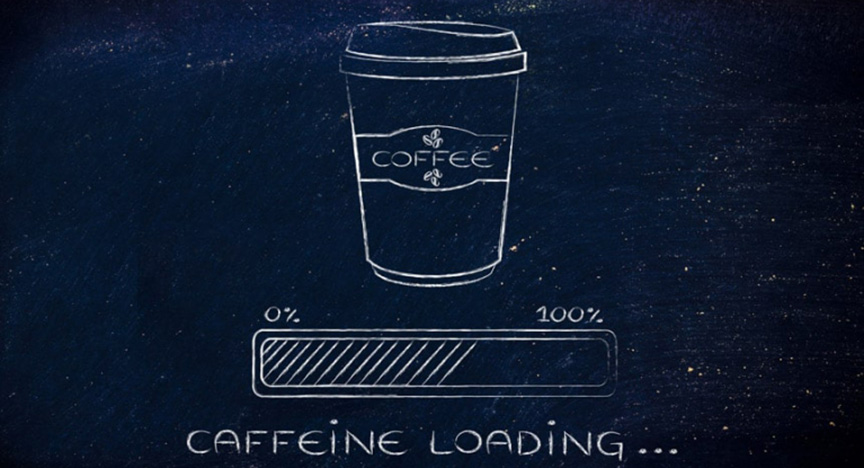
Does your teenager regularly reach for a coffee, energy drink, or other caffeinated beverage in the lead up to an exam or before a sports match? Ever wondered what this might be doing to their health, and how concerned should you be about their inclination to reach for the coffee cup? Read on to learn how much is too much, and if you need to curb their enthusiasm for the bean juice.
What is caffeine?
Caffeine is a naturally occurring compound found in the leaves and fruits of certain plants. It is a central nervous system stimulant of the metylxanthine class, and works by stimulating the brain and central nervous system, helping the consumer to stay alert. In small doses, it can make you feel refreshed and focused. In large doses, it can cause anxiety and sleeplessness (see more below).
The recommended safe amount for most healthy adults is 400 milligrams (mg) of caffeine a day – that’s about four cups of brewed coffee. The actual caffeine content in beverages varies widely, especially among energy drinks, so it’s important to check the labels and know what you are drinking.
What does caffeine do to the body?
For many people, reaching for a morning cup of coffee for an energy boost is part of their morning ritual. However, too much caffeine can lead to insomnia, jitteriness, a rise in body temperature, dehydration, gastrointestinal inflammation, frequent urination, dizziness and headaches, difficulty concentrating, anxiety and irritability, and an increased heart rate.
In younger children, these symptoms can occur after only a small amount of caffeine. It even has the potential to aggravate health problems, particularly any heart issues. Further, childhood and adolescence are the most important times for bone strengthening, and caffeine in children and teenagers can interfere with calcium absorption.
Children who drink coffee are also more likely to have oral health problems because coffee is acidic and decreases tooth enamel (it can take years for new enamel to harden once adult teeth have come in).
Caffeine is also not the only problem ingredient with many popular modern beverages. Many coffee drinks also contain staggering amounts of sugar, fat and calories. Blended, milkshake-like coffee drinks, such as the ‘Frappuccino’, are usually the biggest culprits. The popularity of caffeinated beverages that aren’t coffee are also on the rise, including Red Bull, Monster energy drinks, and V, which can contain other harmful chemicals, as well as unhealthy amounts of sugar.
How much is too much?
Like most things in life, when it comes to coffee and caffeine, moderation is key – especially in a child or young person’s diet. There is no black or white answer as to when a child should start drinking coffee, but Dr Melinda White, A/Director of Dietetics and Food Services at Children’s Health Queensland, recommends waiting until the end of adolescence (19 years) to start drinking coffee regularly.
“The Australian Guide to Healthy Eating canteen guide recommends that coffee-style products (including flavoured), and coffee-style milk drinks are avoided until high school.
It is best to also avoid caffeinated drinks in adolescents while they are growing and bones are developing. If your child does drink caffeinated drinks during this time, keep serving sizes small, or under 375ml serve size.”
A few sips here and there won’t harm your child, but when those sips turn into daily cups, you should encourage them to cut back.
What should I do if my child or teenager already has coffee / caffeine in their diet?
- Know what your child is drinking
Take time to learn the caffeine content in the food and beverages your child is consuming. Nutrition labels often don’t list how much caffeine a product contains, but caffeine itself will be listed on the ingredient list. A quick internet search should reveal how many milligrams are in each product. It’s also important to note the sugar and fat content of your child’s drinks, as most caffeinated beverages have nasty hidden ingredients. - Talk with your child about good health and the risks of caffeine
Explain that many of the caffeinated beverages that may appeal to your child are high in sugar (such as Snapple, Mountain Dew, Monster Energy Drink, Red Bull, instant coffee, and iced tea), and explain why sugar and caffeine should only be drunk in moderation. - Encourage your child to drink water and milk
Avoid stocking the fridge with soft drinks, and don’t buy teas, energy drinks, or other beverages with a lot of caffeine. Instead, make it a habit for everyone in the family to drink water and low-fat milk, and treat other drinks as treats. - Limit afternoon and evening caffeine
Drinking a Frappuccino after school, or an energy drink after basketball practice, could keep your child up half of the night. If they’re going to drink caffeine, encourage them to limit their consumption to the first half of the day, or at least six hours before bedtime. - Watch for signs of over-consumption
If your child is jittery or having trouble sleeping, talk to them about their caffeine intake. If the jitteriness and sleeping problems are not stemming directly from the caffeine intake, they may be caused by anxiety that is a result of their consumption. Sleep deprivation because of caffeine can have a snowball effect on their education, and mental and physical health, so it’s important to identify and address any problems early.